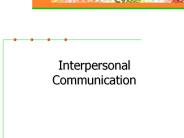Effective Interpersonal Communication - PowerPoint PPT Presentation
1 / 13
Title:
Effective Interpersonal Communication
Description:
1. Effective Interpersonal Communication. Presented by. Felicity Mildon. Wednesday 2nd August 2006 ... 'At its most basic, communication is about sending and ... – PowerPoint PPT presentation
Number of Views:82
Avg rating:3.0/5.0
Title: Effective Interpersonal Communication
1
Effective Interpersonal Communication
- Presented by
- Felicity Mildon
Wednesday 2nd August 2006
2
Session Objectives
- Understanding body language
- Active listening
- Questioning techniques
- Assertive communication
3
Communication is
- At its most basic, communication is about
sending and receiving messages. The sender is
responsible for ensuring the receiver understands
the message correctly.
4
Barriers to Communication
- Age/experience
- Status
- Noise
- Emotions
- Stereotyping
- Assumptions
- Language
- Culture
- Defensiveness
- Too much information
- Jargon
5
Body Language
- Over 80 of our message is interpreted through
our body language
6
Active Listening
- What makes a good listener?
- body language
- eye contact
- using appropriate gestures
- asking questions
- not interrupting
- parpahrasing
7
Paraphrasing
- Is checking for understanding by putting in our
own words what you understand the other person to
mean. - e.g. Youre feeling because.
8
Examples of paraphrasing
- It sounds as if.
- Am I correct in saying
- So you think that..
- In other words.
- It seems as if
9
Questioning techniques
- Open questions What do you like most about your
job? - Closed questions Do you have a degree?
10
Meta Questioning Techniques
- Avoid the question why?
- Instead, ask Who?
- What?
- When?
- Where?
- How?
11
Assertive Communication
- Assertive communication allows you to raise your
own needs while respecting the needs and rights
of others. - It avoids aggressive or passive behaviour
12
I statements
- When.(non evaluative)
- I feel/am..
- Id prefer..
13
Any questions?































